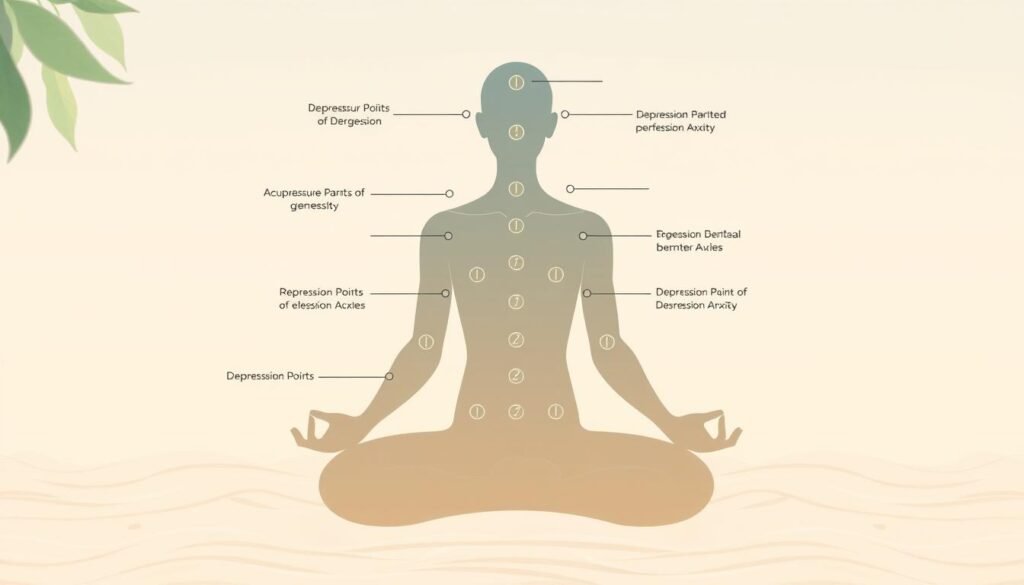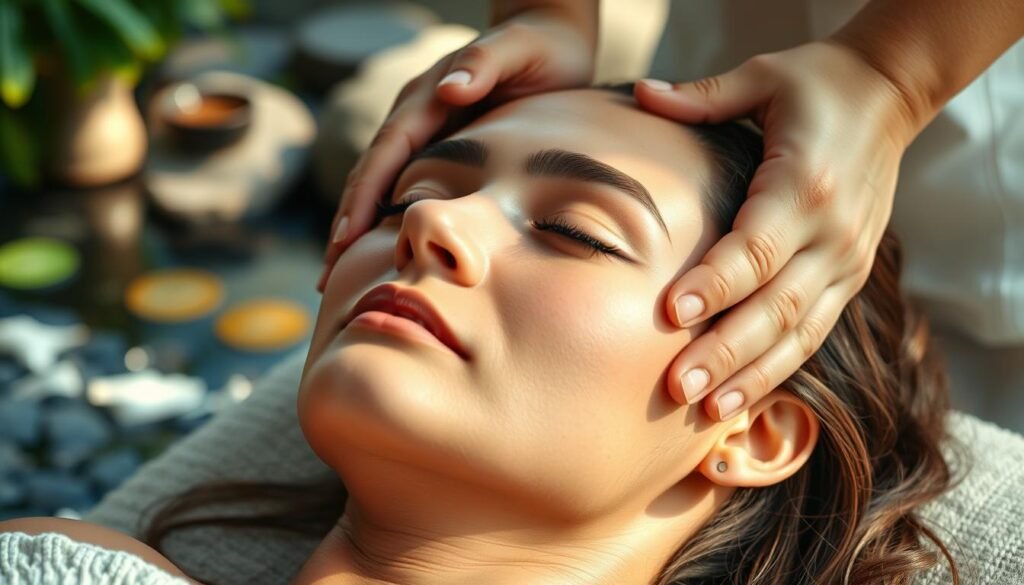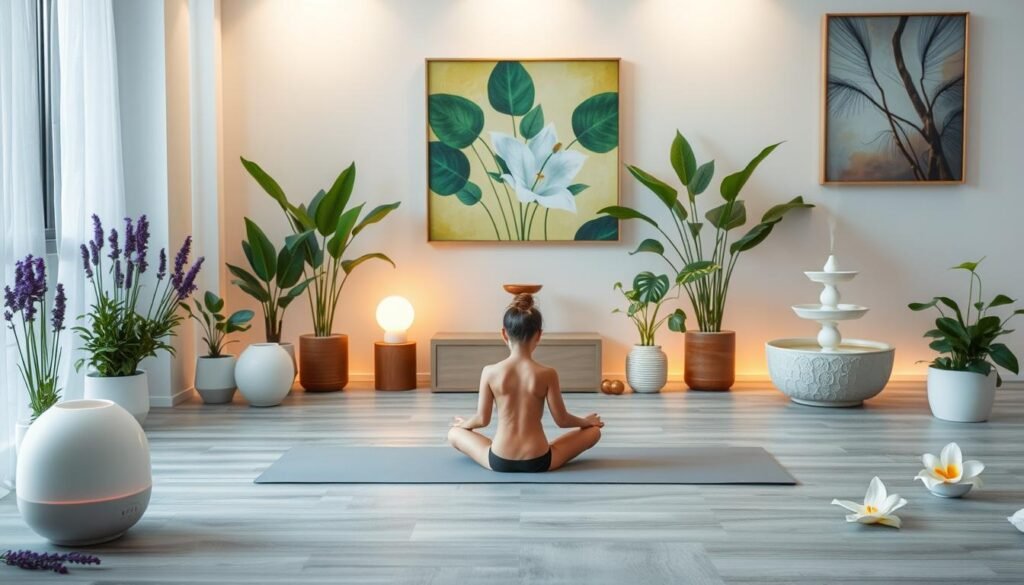Did you know acupuncture and acupressure can really help your mood? These old methods are great for helping the body feel relaxed. They make the body release endorphins, which are natural substances that make you feel good. Acupressure, especially, is getting noticed for its way of handling stress by pressing certain body points.
This guide talks about how acupressure works and comes from Chinese medicine. It looks at how acupressure can help with feeling down or anxious. It combines easy-to-follow steps for calming anxiety with ideas on staying mentally strong. So, people can learn ways to deal with stress and anxiety on their own.
Key Takeaways
- Acupressure can stimulate feel-good chemicals in the body.
- Specific acupressure points are linked to reducing anxiety and depression symptoms.
- Using acupressure is a holistic approach to managing mental wellness.
- Practicing acupressure can lead to long-lasting emotional benefits.
- Individuals with severe symptoms should consider seeking professional help.
Understanding Acupressure Therapy
Acupressure therapy comes from traditional Chinese medicine. It focuses on pressing specific points on the body to help energy flow better. Doing this may help the body heal itself, reducing anxiety and depression.
This method is often used with other treatments, like medication or therapy. It lets people use natural ways to deal with stress at home.
Acupressure has been found to lower stress and sadness. Many studies show its benefits for mental and overall health.
Acupressure can help with mild to moderate anxiety and depression, but results can vary. For some, it’s a big help, for others, not as much. It’s easy to try, which makes it appealing for those looking for a natural approach.
Traditional Chinese Medicine and Its Approach to Mental Wellness
Traditional Chinese Medicine (TCM) looks at mental wellness in a special way. It sees emotional health as tied to Qi, or vital energy, in the body. If this energy flow gets out of balance, it can cause problems like anxiety and depression. TCM works to fix the root causes, not just the symptoms.
TCM uses different methods to help with anxiety and boost mental health. Acupuncture puts thin needles into certain spots to get energy flowing and improve relaxation. Acupressure does something similar but uses pressure instead of needles. This helps the body heal naturally.
In TCM, treatments are made just for you. Herbal mixes are put together based on what you specifically need. They aim to fix symptoms and bring back balance. Herbs like ginkgo biloba and Chaihu are common, and mixes like haihu shugansan and kaixinsan are backed by research for fighting anxiety and depression.
Exercises like Qi Gong and Tai Chi are also important in TCM. They boost physical health and make your mind and emotions stronger. TCM also suggests certain foods to help your energy flow better and support your emotional wellness.
TCM offers a full plan for mental wellness, connecting physical and emotional health. It encourages good energy flow and natural healing. This can help people manage anxiety and find better mental health with practices that have been used for ages.
Benefits of Acupressure for Anxiety Relief
Acupressure is great for those looking for anxiety relief. This old method from traditional Chinese medicine works by pressing certain points on the body. It aims to balance your body’s energy and bring calm during stressful times.
Using acupressure can really help with anxiety. Techniques like pressure point massage lower stress. Doing this often can make you feel more balanced and relaxed.
Studies have found that acupressure not only reduces stress but also calms you down. This is more so than some other treatments. By focusing on certain points, it can lessen pain and tension from anxiety, which is great for your overall health.
Experts say that pressing specific points for 30 seconds to three minutes works wonders. You can do this any time you feel anxious. It’s a quick way to get relief.
The Link Between Acupressure and Depression Management
Acupressure is gaining popularity as a way to manage depression. It uses pressure on certain points to help balance emotions. This can lead to better mood and less sadness.
Acupressure can naturally boost endorphins, making you feel better. Studies show it can increase relaxation and emotional health.
A big study looked at how acupuncture helps depression. It included 2,268 people and found good results. This suggests acupressure might help too. People feel better with regular use.
Some people use acupressure along with other treatments. Depression is a big issue worldwide. Adding acupressure could improve mental health care.
Acupressure can make medications work better. It offers a more complete approach to treating depression. Combining it with usual care might help people more.

Key Acupressure Points for Depression and Anxiety
Seeking effective relief for depression and anxiety is vital. Key acupressure points offer a method for reducing symptoms. By pressing specific areas, individuals can manage stress better. Below, important acupressure points are discussed for their calming benefits.
Hall of Impression Point (Yintang)
Found between the eyebrows, this spot eases anxiety and stress. A gentle press here can make you feel calmer.
Heavenly Gate Point (Shen Men)
Located at the upper ear, this point is great for lessening anxiety. It helps in promoting peace of mind.
Shoulder Well Point (Jian Jing)
This point focuses on relieving shoulder stress and tension. It’s essential for feeling less anxious.
Union Valley Point (He Gu)
Between the thumb and index finger, pressing this spot helps with stress. It’s also good for headache relief, improving well-being.
Great Surge Point (Tai Chong)
On the foot, this point aids in easing stress and pain. Stimulating it brings extra comfort in tough times.
Inner Frontier Gate Point (Neiguan)
It’s located below the wrist and known for anxiety and nausea reduction. It helps calm restlessness and heart palpitations, fostering peace.
| Acupressure Point | Location | Function |
|---|---|---|
| Hall of Impression (Yintang) | Between the eyebrows | Relieves anxiety and stress |
| Heavenly Gate (Shen Men) | Upper ear | Diminishes anxiety, promotes relaxation |
| Shoulder Well (Jian Jing) | Shoulder area | Targets muscle tension and stress |
| Union Valley (He Gu) | Webbing of hand | Aids in stress reduction |
| Great Surge (Tai Chong) | Foot | Helps relieve stress and pain |
| Inner Frontier Gate (Neiguan) | Three finger widths below wrist | Reduces anxiety and nausea |
How to Use Pressure Point Massage for Effective Results
Pressure point massage offers big benefits for anxiety and depression. It uses acupressure techniques on certain body points. This helps you relax and feel better.
Create a calm space first. A quiet, dimly lit place with soft music is perfect. Know the important points like Heart 7, Neiguan, and Yin Tang. They’re great for easing anxiety and depression.

- Identify the Points: Use a guide to learn where acupressure points are.
- Apply Pressure: Start with light pressure using fingers or a tool. Increase pressure as you’re comfortable.
- Focus on Breathing: Breathe deeply and slowly while applying pressure. This helps you relax more.
- Duration: Spend 1 to 2 minutes on each point. Adjust time as needed for comfort.
Doing this regularly helps you know your body better. It can lower your anxiety and depression. The key is to keep practicing to see improvements.
But, acupressure shouldn’t replace doctors or medicines. If problems continue, see a professional. For more tips on acupressure, check out these techniques.
Research Supporting Acupressure for Anxiety Treatment
Acupressure is gaining attention as a hopeful choice for anxiety treatment. There’s a lot of acupressure studies backing this up. A big review looked at 1,110 studies, and 39 passed their strict tests. This shows strong interest in acupressure’s healing effects.
In these studies, people trying acupressure felt much less anxious. They had a score showing a big improvement, way better than those who didn’t get acupressure. Even fake acupressure helped, though not as much. This hints at the real and placebo effects in easing anxiety.
After COVID-19 hit, more people wanted help for their minds. In the U.S., over 40% in a survey reported mental struggles like anxiety. The World Health Organization (WHO) says the pandemic caused lasting troubles. With over 521 million having had COVID-19 worldwide, stress and depression shot up.
Acupressure also helped those who beat COVID-19 but felt anxious afterward. A Shanghai study found 42% felt this way. They tried pressing beads on their ears for two weeks. Nobody quit the study, showing they liked this treatment.
Still, we need more studies on acupressure. But so far, it seems safe for fighting anxiety without bad side effects. It suggests acupressure can be more than just quick help. It might fit well into wider plans for mental health care.
Complementary Stress Reduction Techniques Alongside Acupressure
Adding stress reduction methods can boost acupressure’s benefits. Practices like mindfulness meditation, yoga, and breathing exercises are key. They support total wellness and help tackle emotional challenges.
Mindfulness meditation focuses on living in the now. This can lessen anxiety and brighten mental health. It helps achieve a peaceful state of mind.
Yoga blends movement with breath control for stress relief. It makes you more flexible and mentally strong. Adding yoga to your daily life boosts acupressure’s effects.
Breathing exercises involve slow, deep breaths. They help you stay calm in stressful times. This technique is easy to do anywhere, adding to your stress-busting tools.
Emotional Freedom Techniques (EFT) tapping is promising. Created by Gary Craig in the 1990s, it combines acupressure point tapping with expressing feelings. It clears the mind and eases emotions. Studies show it can lower heart rates and cortisol, aiding many, including veterans and trauma survivors.
Combining stress reduction methods with acupressure offers a full approach to tackling stress, anxiety, and depression. For those seeking alternative mental health options, trying different strategies could provide broader benefits. Look into resources like acupuncture and natural antidepressants as part of your wellness plan.
| Technique | Benefits | Compatibility with Acupressure |
|---|---|---|
| Mindfulness Meditation | Reduces anxiety, Enhances emotional balance | Complementary |
| Yoga | Improves flexibility, Promotes resilience | Supportive |
| Breathing Exercises | Grounds patient, Reduces immediate stress | Compatible |
| EFT Tapping | Reduces physiological stress markers, Enhances emotional clarity | Collaborative |

When to Seek Professional Help for Anxiety and Depression
Knowing when to get help for anxiety and depression is key. If your day-to-day life suffers because of these feelings, it’s time to seek a professional. Symptoms like constant sadness, too much worry, or trouble with everyday tasks show you might need extra support.
While self-care like acupressure can help, it might not be enough. You should think about getting professional advice if:
- You feel hopeless or worthless all the time.
- Your anxiety causes panic attacks or extreme stress.
- It gets harder to do daily tasks.
- Self-care isn’t helping.
- You think about hurting yourself or suicide.
There are many ways to get help. Mental health experts, like therapists, understand your needs and offer personalized advice. Crisis lines give immediate support, showing that asking for help is brave.
| Signs You Should Seek Help | Potential Treatments |
|---|---|
| Persistent sadness | Cognitive Behavioral Therapy (CBT) |
| Inability to focus | Medication management |
| Social withdrawal | Group therapy |
| Physical symptoms of stress | Acupuncture or acupressure |
| Thoughts of self-harm | Emergency psychiatric services |
Getting help for anxiety or depression can make your life better and happier. Taking that step to reach out can improve how you feel mentally.
Conclusion
Exploring acupressure points for depression and anxiety showcases its value in mental health. Studies show acupressure helps ease depression symptoms. It also lowers stress and anxiety levels.
Research on breast cancer survivors revealed acupressure’s advantages in fighting depression and poor sleep. This *holistic healing* method impacts emotional well-being positively.
Stress levels drop noticeably in various groups, like nursing students, with acupressure. They feel their life quality improves. This emphasizes the link between mental and physical health.
Using acupressure regularly could enhance individuals’ wellness paths. Hence, understanding acupressure invites people with anxiety and depression to try this safe method. It works well with other stress-reduction techniques.
As more research emerges, acupressure’s role in mental health will likely grow. It offers a promising option for those seeking emotional balance. It’s becoming a key player in mental wellness.